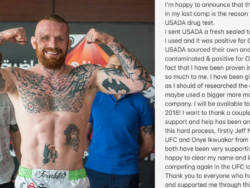The trouble with Ostarine: Jimmy Wallhead’s
16th March 2018
Features


A total of 23 athletes from 12 countries, competing in eight sports, were involved in anti-doping proceedings that came to light this week. High profile cases include a three and a half year ban issued to former Zimbabwean cricket Captain Brendan Taylor, and confirmation that Jamaican sprinter Nesta Carter has been sanctioned with a four year ban for an anti-doping rule violation (ADRV) involving Clomiphene.
Only one month of Taylor’s three and a half year ban involves doping, in a case that illustrates how recreational substances can be used in an attempt to trap athletes into match-fixing. Taylor was initially approached by ‘Mr S’ to see if he would be interested in playing in the 2019 Afghanistan Premier League. In late October 2019, he was flown to India by ‘Mr S’ to discuss a T20 tournament in Zimbabwe and was paid US$15,000 for his trouble.
At the end of the three day trip, Taylor was told he could make US$35,000 from spot fixing in upcoming games. During the trip, Taylor claimed (see Tweet below) that he was offered cocaine, which he took. ‘Mr S’ and his associates then apparently threatened to release a video of him taking cocaine unless he complied with their spot fixing proposal.
https://twitter.com/BrendanTaylor86/status/1485522867768991745
Taylor took a $15,000 deposit in order to leave India and after being contacted by ‘Mr S’ again in mid March 2000, reported the matter to the International Cricket Council’s (ICC) Anti-Corruption Unit (ACU) on 31 March. However, his adverse analytical finding (AAF – or ‘positive test’) for cocaine took place on 8 September 2021, over a year after these events. As his statement highlights, he is currently undergoing rehabilitation.
The Athletics Integrity Unit’s (AIU) January list of sanctions issued by national athletics federations confirms that Nesta Carter has been sanctioned with a four year ban expiring on 24 November 2025, for a second ADRV. The Jamaican sprinter returned an AAF for clomiphene in February last year, and maintains that it is due to prescribed medication. Clomiphene is commonly used to treat female infertility, however has been used as an alternative to testosterone replacement therapy in men.
Carter was previously sanctioned for an ADRV involving methylhexaneamine in January 2017, which he argued could have been due to contaminated supplements. The 2017 sanction resulted from reanalysis of a sample taken in 2008, which resulted in the Jamaican 4x100m team losing a Gold medal won at the Beijing 2008 Olympics. Methylhexaneamine was not detected in Carter’s sample in 2008 because the Laboratory concerned wasn’t searching for it, since it wasn’t specifically mentioned in the Prohibited List at the time. It didn’t feature until the 2010 Prohibited List was published.
The dangers that contamination pose to athletes was emphasised by a case involving a young Italian tennis player. Matilde Paoletti will have an ADRV on her record but will not serve a ban, after her AAF for a tiny amount of a metabolite of clostebol was found to be caused by medication prescribed to her dog.
Paoletti returned an AAF for 0.05ng/mL of a metabolite of clostebol in a 19 July test last year. Tests for such tiny amounts of prohibited substances are valid, as they can pick up AAFs from athletes coming to the end of a doping cycle.
‘The ITF [International Tennis Federation] accepts, in the exceptional circumstances of this case and in light of all of the evidence provided by the Player, that the Player acted with No Fault or Negligence in relation to her violation because she has established that she did not know or suspect and could not reasonably have known or suspected even with the utmost caution that she had used clostebol or was at risk of ingesting clostebol simply by cuddling, interacting with, and sleeping next to the family dog’, reads the full Decision. ‘In particular, the Player was not aware that the dog was being treated with Veterabol (containing clostebol) and had no reason to suspect that this treatment was taking place in the days leading up to sample collection. Given the Player was not aware that her mother was applying Veterabol (or any medication or treatment) to the family dog, nor was she aware that the dog continued to require any treatment or medication at all, the ITF accepts that the Player could not reasonably have known or suspected even with the exercise of utmost caution that simply by interacting with the family dog in her usual manner the Player would be exposing herself to the risk of contamination with a prohibited substance.’
As the ITF was satisfied that she had demonstrated No Fault or Negligence, Paoletti will not serve a period of ineligibility nor will she have any results annulled. However, she will still have an ADRV on her record which, as Carter’s case illustrates, could result in a longer ban being issued if she is involved in a second ADRV.
Please continue to send any cases we may have missed or suggestions through to our editor by clicking here. Also, if you’re an athlete, national anti-doping organisation (NADO) or other Results Management Authority and you’d like us to cover a case that you’re involved with, please get in touch! Also – a reminder. The SII Anti-Doping Monitor only features confirmed AAFs (‘positive tests’) or confirmed anti-doping rule violations (ADRVs).
Matilde Paoletti (Full Decision);
Brendan Taylor (Doping Decision – Spot-fixing Decision);
Victor Leon Delgado, Igor Glavan (Hlavan – Decision), Elisabeth Niedereder, Mohammad Abbas Rezaei, Nicolas Camargo, Ali Dhahir Alhamd, Natalya Grigoryeva, Nesta Carter, Said Rbina (Brina) – See AIU’s List of January Sanctions.
• Eleven athletes (and a horse trainer) from eleven countries, competing in nine sports, were...
• 20 athletes from nine countries, competing in ten sports, were involved in anti-doping proceedings...
• Twenty four athletes from 13 countries, competing in eight sports, were involved in anti-doping...